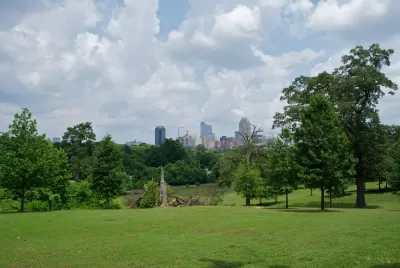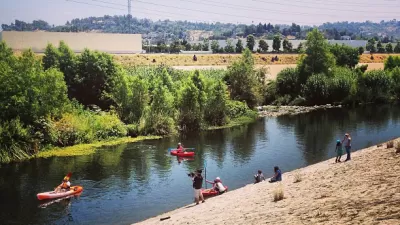Researchers have made a positive link between increased greenery in a child's neighborhoods and a reduction in aggressive behavior.

Researchers from the University of Southern California have identified the contribution that nature can play in reducing aggressive behavior in adolescents and teenagers. Reporting in Pacific Standard, Tom Jacobs writes that the study of over 1,200 children between the ages of 9 and 18, from 640 families in Los Angeles found that close proximity of green space to the children's homes resulted in less aggressive behavior.
“We found strong evidence supporting the benefits of neighborhood green space in reducing aggressive behaviors,” the researchers write. “The results of our adjusted analyses suggest a consistent pattern of decreased aggression associated with increasing residential green space within a 1000-meter buffer.”
They found no evidence this impact was limited to wealthier or poorer neighborhoods, and report it still held true after accounting for such factors as traffic density and proximity to freeways.
The study concludes that there is a clear benefit to mental health from interacting with natural environments, whether through providing access to areas for physical activity, reducing an area's ambient noise, or reducing pollution levels.
FULL STORY: Teenagers Surrounded by Green Are Less Aggressive

Maui's Vacation Rental Debate Turns Ugly
Verbal attacks, misinformation campaigns and fistfights plague a high-stakes debate to convert thousands of vacation rentals into long-term housing.

Planetizen Federal Action Tracker
A weekly monitor of how Trump’s orders and actions are impacting planners and planning in America.

In Urban Planning, AI Prompting Could be the New Design Thinking
Creativity has long been key to great urban design. What if we see AI as our new creative partner?

Florida Seniors Face Rising Homelessness Risk
High housing costs are pushing more seniors, many of them on a fixed income, into homelessness.

Massachusetts Budget Helps Close MBTA Budget Gap
The budget signed by Gov. Maura Healey includes $470 million in MBTA funding for the next fiscal year.

Milwaukee Launches Vision Zero Plan
Seven years after the city signed its Complete Streets Policy, the city is doubling down on its efforts to eliminate traffic deaths.
Urban Design for Planners 1: Software Tools
This six-course series explores essential urban design concepts using open source software and equips planners with the tools they need to participate fully in the urban design process.
Planning for Universal Design
Learn the tools for implementing Universal Design in planning regulations.
Gallatin County Department of Planning & Community Development
Heyer Gruel & Associates PA
JM Goldson LLC
City of Camden Redevelopment Agency
City of Astoria
Transportation Research & Education Center (TREC) at Portland State University
Jefferson Parish Government
Camden Redevelopment Agency
City of Claremont





























